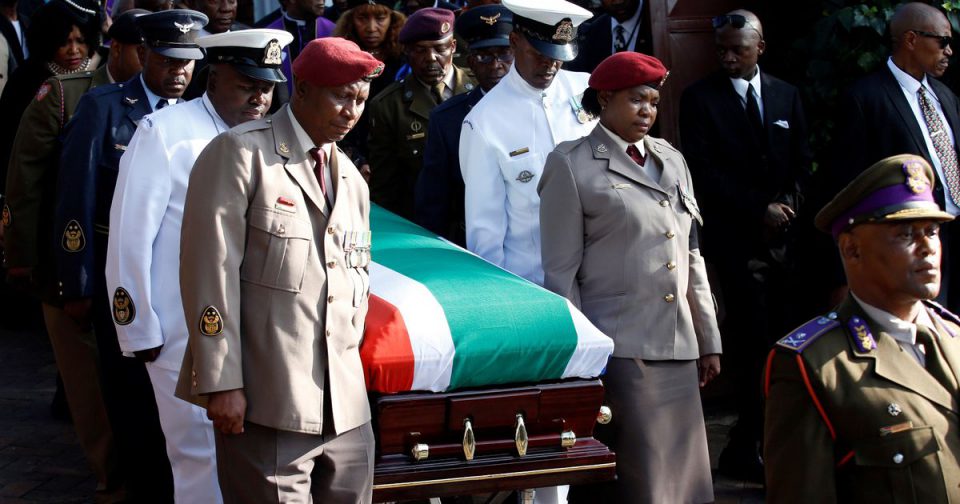South Africa has laid to rest anti-apartheid icon and Nelson Mandela’s former wife Winnie Mandela with full state honours at a stadium funeral in Soweto.
The ceremony concluded 10 days of national mourning during which time thousands of South Africans paid tribute to the “Mother of the Nation” at her Soweto home and elsewhere.
Winnie Mandela, who died in Johannesburg at aged 81 on April 2 after a long illness, has been celebrated for helping keep Nelson Mandela’s dream of a non-racial South Africa alive while he was behind bars for 27 years.
On the eve of the funeral, Winnie Mandela’s body was transferred from a funeral parlour to lie in state at her Soweto home.
Mourners on the street of Soweto as a hearse carrying her coffin return to her home.Hundreds of people lined the township’s streets as a black hearse carrying her body slowly drove to her house led by uniformed men bearing the flag of Mandela’s African National Congress (ANC).
The casket was also draped with an ANC flag.
Gloria Mabasa, 40, had a portrait of Winnie Mandela stamped on one cheek and wore a headscarf with the ANC’s signature green, gold and black colours as she paid her last respects.
“In a way we feel orphaned but their legacy lives on,” said the gym worker who had taken time off to visit Winnie Mandela’s home.
South Africa’s new President Cyril Ramaphosa, who took office two months ago,led the mourners at a pre-burial service to be held in Soweto’s 37,000-capacity Orlando stadium.
American civil rights activist Jesse Jackson also attended, as well as the presidents of Namibia and the Republic of Congo.
“She is truly the mother of South Africa,” Jackson told journalists.
The township of Soweto is hugely symbolic in South Africa as it became a cauldron of black resistance against white minority rule which ended with elections in 1994.
Winnie Mandela’s husband became the first black president of democratic South Africa, but she refused to follow many other struggle-era politicians who moved from townships like Soweto to formerly white-only suburbs after the end of apartheid.
Instead she remained embedded in the community where she met Nelson Mandela at a bus stop in 1957.
After the formal service, Winnie Mandela’s body was buried 40 kilometres (25 miles) north of Soweto, at a privately-run graveyard in Johannesburg’s upmarket Four ways suburb where two of her great-grand children are also buried.
– ‘Symbol of resistance’ –
The funeral closes the final chapter in the history of a woman who was exalted for her fearless defiance of apartheid rule but also implicated in violence and corruption in later life.
UN Secretary General Antonio Guterres has described her as “an international symbol of resistance”.
South Africa’s communications minister Nomvula Mokonyane told AFP that Winnie should not only be remembered for “mistakes or the casualties of the struggle”.
In old age Winnie Mandela emerged as a respected elder who was feted as a living reminder of her late husband — and of the long and celebrated struggle against apartheid.
Most of Winnie Mandela’s 38-year marriage to Nelson was spent apart, leaving her to raise their two daughters alone as she kept his political dream alive.
But when Nelson Mandela died in 2013, it emerged he had left Winnie nothing in his will.
On Saturday, a 21-gun salute was fired and a full honour guard is escorted Winnie’s remains to her final resting place.


